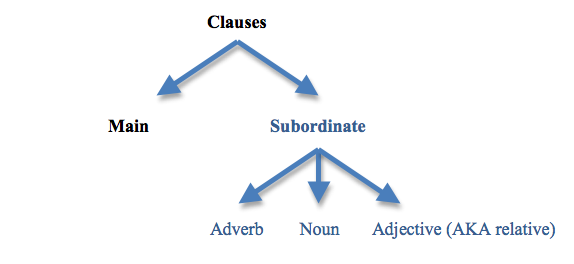|
Sentence Complexity and EmbeddingSubordinationHow can a person tell if a sentence with two clauses is a compound or a complex sentence? The nature of each clause alone is one test (the “if someone walked up and said this, would it sound normal”), but there are others. Another test is to locate the conjunction connecting the two clauses; if it is a coordinating conjunction or a correlative conjunction, then the sentence is a compound sentence. If the conjunction is not a coordinating or a correlative conjunction, then it is a subordinating conjunction, and the sentence is a complex sentence. Remember that the set of coordinating conjunctions is closed and is represented by the acronym FANBOYS. Also, the set of correlative conjunctions is closed, and we have seen the full list of correlatives, too. If the conjunction is not among either of these lists, then it is a subordinating conjunction. Subordinate clauses begin with conjunctions, too. The set of conjunctions that open subordinate clauses are quite simply called subordinating conjunctions. Subordinating conjunctions form a closed set, too, like the coordinating conjunctions and the correlative conjunctions. However, the subordinating conjunctions form a much larger set of words, and there is no easy mnemonic device to help in learning them. Instead, what is more helpful is to learn the three different types of subordinate clauses: 1) adverb clauses, 2) noun clauses, and 3) adjective (or relative) clauses. A diagram that begins to capture the types of clauses in English might look like this:
Fig. 11: Types of Clauses The three types of subordinate clauses get their names form the functions they perform for the main clause to which they are attached. An adverb clause is a subordinate clause that provides information that an adverb word or an adverb phrase might provide in a simple sentence. A subordinate adverb clause can tell where the action of the main clause happened, when it happened, why it happened, how it happened, or in what situations or conditions it happened. A subordinate noun clause provides the kinds of information and acts in the same roles as nouns and noun phrases usually act in a simple sentence. A noun clause can be the subject, direct object, indirect object, object of a preposition, subject complement, object complement, or an appositive. An adjective or relative clause provides the kinds of information and acts in the same ways that an adjective or adjective phrase acts in a simple sentence. The subordinating conjunctions that open subordinate clauses depend on which type of subordinate clause is used, and so the best way to approach the study of complex sentences and the subordinate clauses in them is to look carefully at each different type of subordinate clause. The next three chapters will do just that. End of Lesson
|
